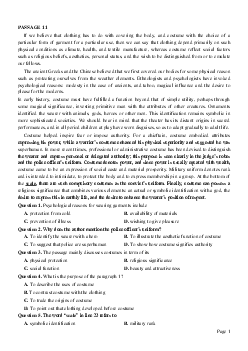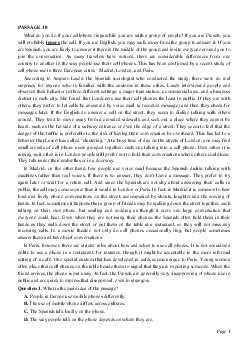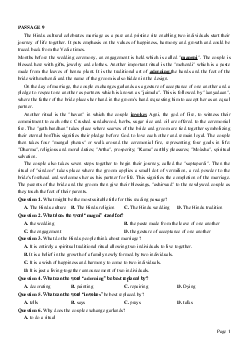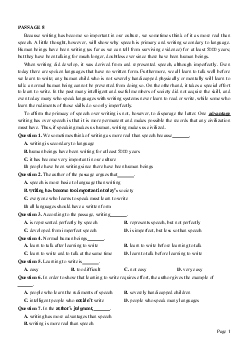



Preview text:
PASSAGE 23
BECOMING AN EFFECTIVE STUDENT
Learning how to study effective is an essential skill for students in any discipline. There are six areas
which are crucial to developing good study habits. Work on these and you will become an effective student. Targets
Always set a realistic work target. Don't try to do much. For example, plan to read one chapter of a
book each evening rather than think about reading the whole book over the weekend. This kind of
detailed, planned target is more effective than a vague commitment. It is sometimes helpful to tell your
friends about your plan. This is a good incentive to keep you on target because they will know if you fail! Rewards.
Develop a system of small rewards for your work. For example, stop for a cup of coffee or tea, or listen to
a favorite piece of music after one hour's study. Rewarding yourself for keeping to your work plan will
make you feel good about yourself. Timing
Make sure you choose a suitable time to study, i.e. when it is quiet and when you ate most alert. Try to
make this a regular, time-tabled part of your day. If you plan to start work at a certain time, say 7 pm, do
not find reasons to put off getting started. You can watch a DVD later, and your emails are not urgent! Quantity
A large task such as researching a new topic for an essay can be daunting - so daunting, in fact that it can
be difficult to sit down and make a start. Break the larger task down into several smaller ones. For
example, make a list of questions that you will have to deal with your essay, and then approach each
question separately. This makes the work more manageable.
Notes and Learning styles.
The books you are studying won't always present information in a way that suits your learning style. It is,
therefore, worthwhile spending time making notes and organizing them in a way that suits you best. It is
also a good idea to keep your notebooks neat and well-organized. This will make it much easier to retrieve information later. Revision.
Don't leave revision until the last moment. When you set your study targets, allow regular revision time.
This is much more effective than trying to cram before an exam.
Question 1. How do the writer think you can develop good study habits?
A. By setting a realistic work target
B. By planning and considering your learning style
C. By revising your work on a regular basis
D. By taking into account six important areas
Question 2. Why is it good idea to tell other people about your work plan?
A. They can help you develop a detailed target
B. They will be very helpful with your plan
C. They will know if you do not stick to your plan, which motivates you to reach the target
D. They will know how to help you avoid failing
Question 3. Which of the following words is closest in meaning to the word "vague" in paragraph 2? Page 1 A. unrealistic B. inefficient C. unclear D. impractical
Question 4. Timing includes all of the following EXCEPT.
A. you must be able to think clearly at the chosen time to study
B. the best time to study is 7 p.m
C. the time to study should be made a routine
D. don't delay getting started
Question 5. How can complicated piece of work be made easier?
A. Try to sit down and make start anyway
B. Make a list of questions beforehand
C. Divide the large task into manageable smaller segments
D. Manage the tasks on by one
Question 6. The word "daunting" in the paragraph 5 is closest in meaning to which of the following? A. frightening B. demanding C. challenging D. discouraging
Question 7. What is NOT the benefit of keeping good class or lecture notes?
A. The information is tailored to your learning style
B. It enables you to find information quickly when needed
C. The information is favorably organized to your liking
D. You do not need to spend time on the books you are studying
Question 8. The most suitable phrase to replace the word "cram" in the last paragraph is.
A. study hard in a short time B. revise hastily
C. stay up late to study D. revise overnight ĐÁP ÁN 1-D 2-C 3-C 4-B 5-C 6-A 7-D 8-A
LỜI GIẢI CHI TIẾT Question 1: D
Làm thế nào để nhà văn nghĩ rằng bạn có thể phát triển thói quen học tập tốt?
A. Bằng cách đặt mục tiêu công việc thực tế
B. Bằng cách lập kế hoạch và xem xét phong cách học tập của bạn
C. Bằng cách sửa đổi công việc của bạn một cách thường xuyên
D. Bằng cách tính đến sáu lĩnh vực quan trọng
=> Learning how to study effective is an essential skill for students in any discipline. There are six areas
which are crucial to developing good study habits.
Học cách học hiệu quả là một kỹ năng thiết yếu cho sinh viên trong bất kỳ ngành học nào. Có sáu lĩnh
vực rất quan trọng để phát triển thói quen học tập tốt. Question 2: C
Tại sao nên nói với người khác về kế hoạch làm việc của bạn? Page 2
A. Họ có thể giúp bạn phát triển mục tiêu chi tiết
B. Họ sẽ rất hữu ích với kế hoạch của bạn
C. Họ sẽ biết nếu bạn không bám sát kế hoạch của mình, điều này thúc đẩy bạn đạt được mục tiêu
D. Họ sẽ biết cách giúp bạn tránh thất bại
=> Dẫn chứng: It is sometimes helpful to tell your friends about your plan. This is a good incentive to
keep you on target because they will know if you fail!
Dịch: Đôi khi rất hữu ích để nói với bạn bè của bạn về kế hoạch của bạn. Đây là một động lực tốt để giúp
bạn đạt được mục tiêu bởi vì họ sẽ biết nếu bạn thất bại! Question 3: C
Từ nào sau đây gần nghĩa nhất với từ "mơ hồ" trong đoạn 2? A. không thực tế B. không hiệu quả C. không rõ ràng D. không thực tế Question 4: B
Thời gian bao gồm tất cả các NGOẠI TRỪ sau
A. bạn phải có khả năng suy nghĩ rõ ràng vào thời gian đã chọn để học
B. thời gian học tốt nhất là 7 p.m
C. thời gian học nên được thực hiện
D. đừng trì hoãn bắt đầu
=> Make sure you choose a suitable time to study, i.e. when it is quiet and when you ate most alert. Try to
make this a regular, time-tabled part of your day. If you plan to start work at a certain time, say 7 pm, do
not find reasons to put off getting started.
Hãy chắc chắn rằng bạn chọn một thời gian phù hợp để học, tức là khi nó yên tĩnh và khi bạn ăn uống tỉnh
táo nhất. Cố gắng làm cho điều này trở thành một phần thường xuyên, theo thời gian trong ngày của bạn.
Nếu bạn có kế hoạch bắt đầu công việc vào một thời điểm nhất định, hãy nói 7 giờ tối, đừng tìm lý do để bắt đầu. Question 5: C
Làm thế nào để phần công việc phức tạp có thể được thực hiện dễ dàng hơn?
A. Cố gắng ngồi xuống và bắt đầu nào
B. Lập danh sách các câu hỏi trước
C. Chia nhiệm vụ lớn thành các phân đoạn nhỏ hơn có thể quản lý
D. Quản lý các nhiệm vụ trên một
=> A large task such as researching a new topic for an essay can be daunting - so daunting, in fact that it
can be difficult to sit down and make a start. Break the larger task down into several smaller ones.
Một nhiệm vụ lớn như nghiên cứu một chủ đề mới cho một bài luận có thể gây nản chí - rất đáng ngại,
trên thực tế là có thể khó ngồi xuống và bắt đầu. Chia nhiệm vụ lớn thành nhiều phần nhỏ hơn. Question 6: A A. đáng sợ B. đòi hỏi C. thách thức D. không khuyến khích
=> Một nhiệm vụ lớn như nghiên cứu một chủ đề mới cho một bài luận có thể gây nản chí - rất đáng
ngại, trên thực tế là có thể khó ngồi xuống và bắt đầu Question 7: D Page 3
Điều gì KHÔNG phải là lợi ích của việc giữ cho lớp học tốt hoặc ghi chú bài giảng?
A. Thông tin phù hợp với phong cách học tập của bạn
B. Nó cho phép bạn tìm thông tin nhanh chóng khi cần
C. Thông tin được tổ chức thuận lợi theo ý thích của bạn
D. Bạn không cần dành thời gian cho những cuốn sách bạn đang học
=> The books you are studying won't always present information in a way that suits your learning style. It
is, therefore, worthwhile spending time making notes and organizing them in a way that suits you best. It
is also a good idea to keep your notebooks neat and well-organized. This will make it much easier to retrieve information later
Những cuốn sách bạn đang học sẽ không bao giờ trình bày thông tin theo cách phù hợp với cách học của
bạn. Do đó, rất đáng để dành thời gian ghi chú và sắp xếp chúng theo cách phù hợp nhất với bạn. Nó cũng
là một ý tưởng tốt để giữ cho máy tính xách tay của bạn gọn gàng và được tổ chức tốt. Điều này sẽ giúp
việc lấy thông tin sau này dễ dàng hơn nhiều Question 8: A
=> When you set your study targets, allow regular revision time. This is much more effective than trying to cram before an exam.
Dịch: Khi bạn đặt mục tiêu học tập, hãy cho phép Cụm từ phù hợp nhất để thay thế từ "nhồi nhét" trong đoạn cuối là.
A. học chăm chỉ trong một thời gian ngắn
B. thức khuya học bài C. ôn tập vội vàng D. sửa lại qua đêm
thời gian sửa đổi thường xuyên. Điều này hiệu quả hơn nhiều so với cố gắng nhồi nhét trước một kỳ thi. Page 4




